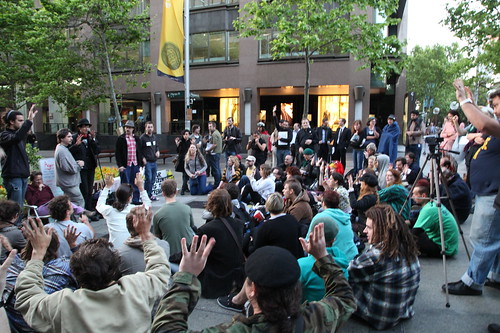
Should we believe that we should organise outside of parties, outside of the State and outside of Left or Right? That with the right process people can come together as people and produce an impetus towards progressive social change? If we strip away presumptions and allegiances can we unite a popular movement such as has never been seen before? I think these arguments show that there are many presumptions intact.
What is it that will produce a new world from these conditions, is it people or process? If it is people, do you believe that we are inherently good, just caught up in structures that distort our humanity? Perhaps we are, but we cannot find a place where these structures do not exist. We will carry them with us into this whatever place you find. Is it the structures? But good processes do not always produce good outcomes. They need the materials too. Is it the combination of the two? Can pure process find the good in mixed materials? We are uneven and irregular; there is no process so perfect that it can refine us without guidance.
We should be honest with ourselves. There are many as many directions for the future as there are facets of humanity. No simple organisational structure can produce the future we want and need.
We are not disinterested. We have a vision of the future that we want. Why should we be ashamed of it and pretend to be only afficionados of process? It goes deeper than that. I wish for humans to have equal economic and political power, for the resources of the world to be used for our benefit and that of future generations. I am not ashamed to call this idea socialism, but I do not hold the name sacred.
If we have this idea and we have an understanding of the problems that make it desirable, why should we keep these to ourselves? We cannot create a space free from the ideologies of power, so why should we make it free from our own?
Our ideas were shaped by years of activism and study; is a few dozen hours in horizontalist meetings enough to turn others into powerful organisers and articulate advocates of the new world? And if some do become socialists and others do not, should they also refrain from arguing their ideas, from organising with those who agree with them to convince the rest?
Perhaps what this process-politics indicates is really a desire for a new birth, for some new subject to emerge and stake its claim. We are tired of our failures and those of others, we are tired of decades of uninterrupted defeat. Most importantly, we are faced with a serious crisis, but cannot turn it into an opportunity.
The situation has changed, and we do need new subjects, even new forms of organisation. But we cannot really believe that we will be able to turn the course of history in a few short years. A new animal, if it is born, will take years to mature, it will take years to grow strong. So let us play biology rather than anatomy, let us look at the stages of this growth and how we might help them. But we should not think that with structure, process and energy alone we can sketch its skeleton and will it to adulthood before its time.










